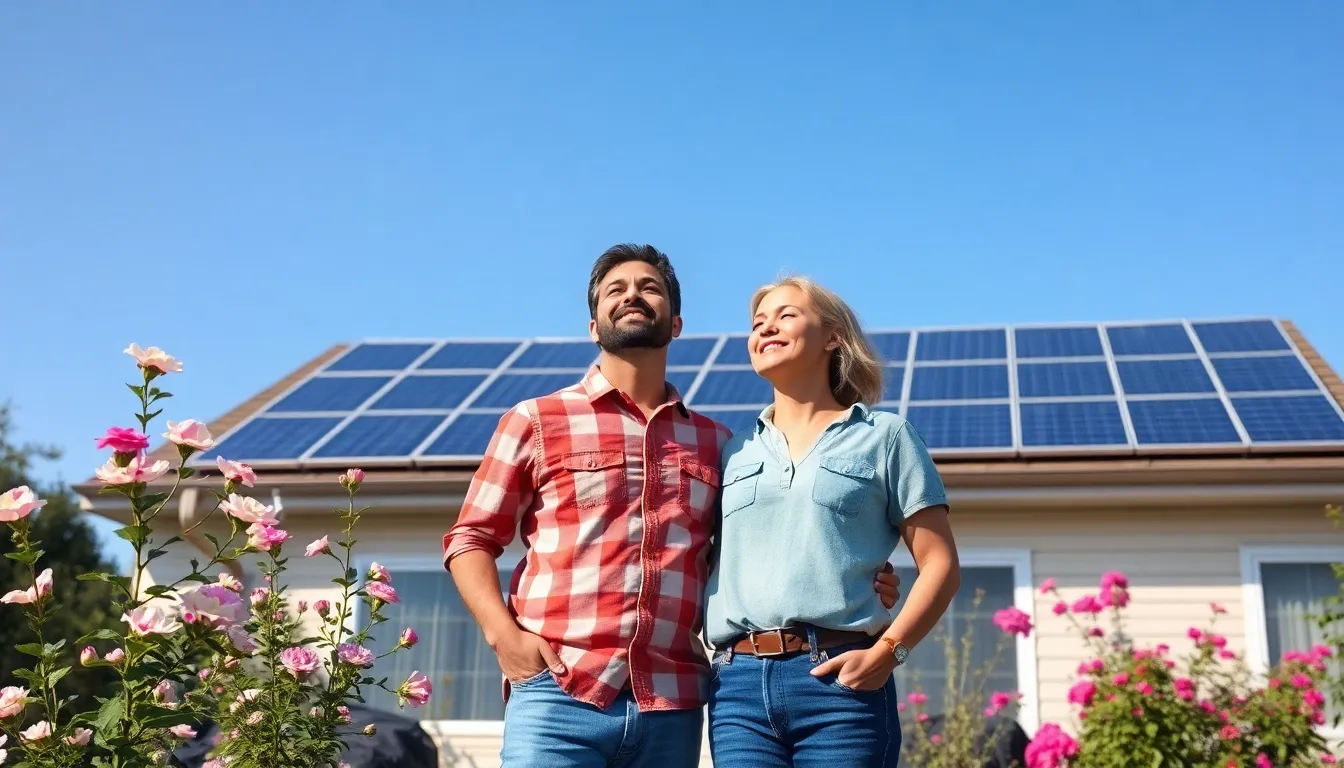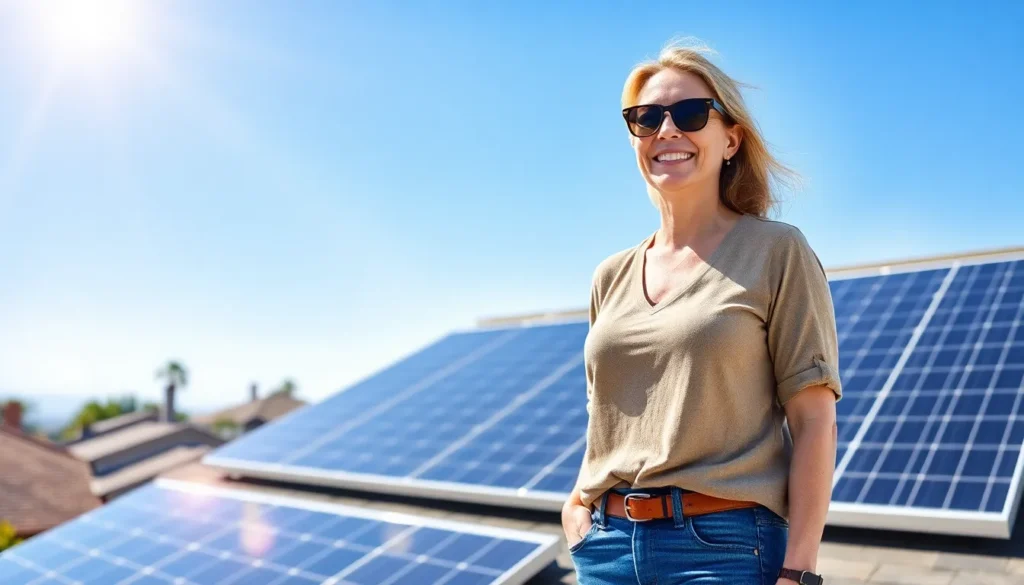Table of Contents
ToggleImagine waking up every morning knowing your home’s energy is powered by the sun, all while saving a few bucks and saving the planet. Welcome to the world of lifestyle solar, where harnessing sunlight isn’t just for beach bums and sunbathers. It’s about making smart choices that fit seamlessly into everyday life.
With solar energy, you can turn your roof into a mini power plant, all while sipping your morning coffee. It’s like having a superhero on your rooftop, swooping in to save you from high electricity bills and guilt about fossil fuels. Embracing lifestyle solar isn’t just a trend; it’s a savvy way to live sustainably and stylishly. So let’s dive into how solar can transform your home and your life, one sunbeam at a time.
What Is Lifestyle Solar?
Lifestyle solar refers to the integration of solar energy into everyday living. It encompasses using solar panels to generate electricity for homes, thereby reducing reliance on traditional energy sources. Homeowners benefit from lower electricity bills while simultaneously contributing to a cleaner environment.
Innovative designs make solar energy not only effective but also aesthetically pleasing. Solar installations complement various architectural styles, enhancing a home’s overall appearance. Flexible options exist for different roofs, including both residential and commercial buildings.
Companies provide numerous products under the lifestyle solar umbrella, such as solar panels, solar roof shingles, and energy storage systems. These components work together to optimize energy usage. Homeowners can monitor energy consumption via user-friendly applications, allowing for efficient management.
Sustainability represents a significant aspect of lifestyle solar. Using renewable energy sources supports efforts to combat climate change and fosters a healthier planet. Furthermore, incentives like tax credits and rebates help offset installation costs, making solar energy more accessible.
Community engagement plays a critical role in promoting lifestyle solar. Participating in local solar initiatives creates networks for sharing information and resources. Through workshops and seminars, residents can learn about the advantages of solar energy.
Embracing lifestyle solar signifies a commitment to a responsible and modern approach to energy consumption. Adopting solar solutions enhances quality of life, providing a sustainable alternative that resonates with both individual and environmental goals. The transition to solar energy reflects a proactive stance in pursuit of energy independence and long-term financial savings.
Benefits of Lifestyle Solar

Lifestyle solar provides numerous advantages that significantly enhance living standards and contribute to environmental protection. Homeowners frequently experience remarkable benefits, from reduced electricity costs to a healthier planet.
Environmental Impact
Solar energy plays a crucial role in minimizing carbon footprints. By harnessing sunlight, it reduces reliance on fossil fuels, lowering greenhouse gas emissions. Wildlife and ecosystems benefit from cleaner air and preserved natural resources. Photovoltaic systems contribute to sustainable practices by generating renewable energy. Many communities embrace solar initiatives, fostering collaboration for a greener future. Cleaner energy supports biodiversity and protects habitats, promoting a balanced ecological system.
Financial Savings
Investing in solar energy translates to substantial savings on electricity bills. Many homeowners report decreases of 50% or more in their monthly energy costs. Upfront costs can be offset by government tax credits and rebates, making solar installations financially viable. Additionally, solar energy systems boost property values, providing long-term financial benefits. Reduced reliance on utility companies enhances energy independence, ensuring more predictable energy expenses. Ultimately, solar power proves to be a cost-effective solution for homeowners seeking sustainability and savings.
Different Types of Lifestyle Solar Solutions
Various lifestyle solar solutions cater to homeowners seeking to enhance energy efficiency while promoting sustainability. Exploring these options reveals innovative technologies that significantly contribute to lower energy costs and a cleaner environment.
Solar Panels
Solar panels represent one of the most popular lifestyle solar solutions. They convert sunlight into electricity, significantly reducing dependence on conventional energy sources. Homeowners can install these panels on rooftops or in yards, allowing them to generate clean energy directly from the sun. Typically, a residential solar panel system can decrease electricity bills by 50% or more, depending on energy usage and system size. Furthermore, advancements in technology have led to more efficient panels, often capturing more sunlight in smaller areas.
Solar Water Heaters
Solar water heaters effectively harness solar energy for residential hot water needs. These systems collect sunlight to heat water, providing an eco-friendly alternative to traditional water heating methods. Significant energy savings can occur, with homeowners often seeing a reduction in water heating costs by up to 80%. Various styles of solar water heaters exist, including active and passive systems, catering to different energy requirements. Additionally, many regions offer incentives to encourage installation, making these systems both affordable and sustainable.
How to Integrate Lifestyle Solar into Your Home
Integrating lifestyle solar into a home involves assessing energy needs and choosing the right system for maximum efficiency and aesthetic appeal. Homeowners can enhance their living spaces while promoting sustainability.
Assessing Your Energy Needs
Start by evaluating overall energy consumption. Homeowners should gather utility bills from the last year to determine monthly usage patterns. Next, consider factors like the number of occupants and lifestyle habits, which directly influence energy demands. It’s essential to identify peak usage times and appliances that consume the most energy. By understanding energy requirements, homeowners can make informed decisions about the size and type of solar system. Consulting with solar professionals can provide insights tailored to specific home needs and ensure optimal performance.
Choosing the Right System
Selecting the appropriate solar system involves examining various types of solar technologies. Photovoltaic panels serve as the most common choice, converting sunlight into electricity with high efficiency. For homes with limited roof space, solar shingles may offer a discreet yet stylish alternative. Energy storage systems such as batteries store excess energy for later use, optimizing efficiency during nighttime or cloudy days. Evaluating installation options, including rooftop versus ground-mounted systems, can affect aesthetics and efficiency. Engage with experts who can recommend equipment that balances budget, performance, and design for a tailored solar solution.
Embracing lifestyle solar represents a transformative shift in how homeowners approach energy consumption. By integrating solar solutions into daily living, individuals not only enjoy substantial financial savings but also contribute to a healthier planet. The aesthetic appeal of modern solar technologies enhances property values while reducing dependence on traditional energy sources.
With various options available, from solar panels to innovative water heaters, homeowners can tailor their solar systems to fit their unique needs. Engaging with local initiatives and professionals ensures a seamless transition to solar energy. Ultimately, adopting lifestyle solar is a proactive step toward energy independence and sustainability, enriching lives and fostering a brighter future.







